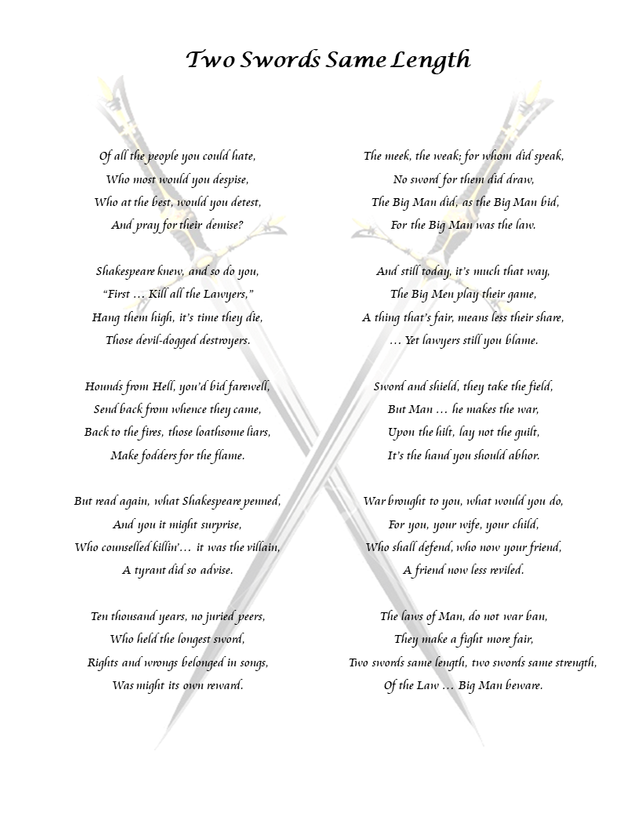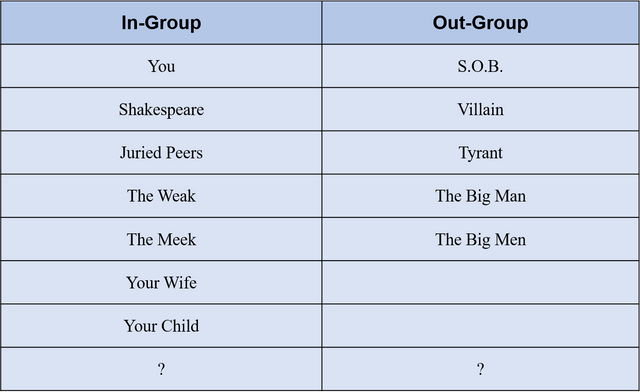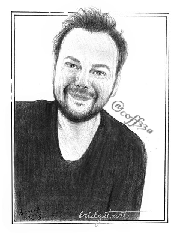“Two Swords Same Length” (poem) … a Lawyer’s Ad and the Science Behind the Art

Everybody Loves to Hate Lawyers
In today’s Age of Political Correctness (run amuck), it has become taboo to criticize any group of people. Except two: politicians and lawyers (and most politicians are lawyers). No one will give you grief for calling lawyers blood-sucking, bottom-feeding, ambulance-chasing scumbags.
But I’ve known a lot of lawyers and, while a couple deserved their salacious reputations, most did not. Most lawyers are actually quite nice people. Husbands and wives, fathers and mothers, just trying to get by like everyone else. There’s a reason this antipathy towards lawyers has persisted throughout the centuries, and why it will continue for centuries more.
The Adversarial System of Justice
What most don’t internalize is that participants in the legal system are role-players. A Prosecuting Attorney (or Plaintiff’s Attorney), Defense Attorney (or Defendant’s Attorney), Judge and, potentially, a Jury – all have assigned roles and responsibilities in the collective drama called a courtroom.
With respect to each of the two lawyers, their roles aren't be fair and reasonable. Their roles are to create two extreme, yet still plausible, versions of the story, each articulating it in a way most beneficial to their respective clients. It is then up to the Judge and/or Jury to weigh the two competing versions of the story and determine where, somewhere in the middle, the truth lies. Because that’s their role.
But here’s the thing: when we observe the process from the outside, we don’t tend to see it as role-playing. All our brains see is “some scumbag lawyer trying to make a ‘bad guy look good,’ or a ‘good one look bad.’” This violates an innate sense of morality within us. We’re supposed to stand up to bullies and bad guys, and we’re supposed to defend the weak and the meek. Period. Importantly, we don't split up the judgement process into its component parts: rather, we pass judgement holistically. Hence, the public tend to view lawyers as 'immoral human beings' as opposed to 'characters playing their part.'
Lawyer Advertising
Person/Character Conflation
I don’t know what it's like where you live, but here in Florida, Lawyer Ads are atrocious, and at times cringe-worthy. Part of the reason is the inverse of the aforementioned: The lawyers present themselves as the 'characters they’re playing' as opposed to the 'human beings they are.'
There is no part of our ancient brains wired to process such conceptual shenanigans. Human beings are programmed to judge one another as human beings, not as some abstract concept. The same goes for those abstract legal concoctions called corporations – we judge them using the only software we have available, the one designed to judge other human beings.
One can frequently observe this phenomenon of person/character conflation at work with actors. Many fans are surprised to learn that the personalities of actors can be radically different than the loved/hated characters they play on TV or in a movie. Our brains are simply not wired to differentiate between the dichotomy and even conscious awareness of the fact rarely negates the effect.
Patterns & Dopamine
This presents some hellacious problems when creating Lawyer Ads … because people are programmed to 'not like lawyers’ from the get-go. So, how do you get around that? Most Lawyer Advertisements don’t even try because the advertising law firm and/or their ad agencies are delusional, believing that its not an issue. “People hate ALL lawyers, so we’re no worse off … and like us or not, they need us.” This is lazy, and perhaps low IQ, rationalizing. If you want people to have a preference for your law firm over all others (the whole point of advertising), the easiest way to accomplish such result, is to cause them to actually want to like you ... especially when they're already inclined to dislike the others.
I’ll defer to another blog post the neuroscience underlying all this, but suffice it to say that if a Lawyer Ad doesn’t cause a lot of dopamine to be secreted in the brain of the viewer, then it was a waste of money. One of the things that triggers dopamine secretion is pattern recognition.
Poetic verse is rich with patterns: meter, rhythm, rhyme, alliteration, etc. And thus, poetic verse causes a cascade of dopamine secretion. (Note: this does not work with free verse ... not patterns, no dopamine.) Besides being the reward chemical (technically, the anticipation of reward) in our brains, it is also the neurotransmitter most associated with: creating focus; holding attention and the formation of memory. Pretty important issues in advertising.
But dopamine is simply a force-multiplier: it multiplies the effect of whatever underlies the stimuli that created it. What underlies such stimuli is an idea, ideal or insight – with insight being the most powerful of the three.
In-Group/Out Group Dichotomy
One of the most powerful functions of our subconscious minds is the creation of In-Group and Out-Group dichotomies. This is an obsession for our brains as we need to differentiate between potential friends and foes, and thereby calibrate our beliefs and behaviors accordingly. It helps regulate our social expectations and responses. In advertising, this is powerful mojo.
The poem starts off asking you to identify, and therefore think about, the person you hate the most. Whomever that is, I guarantee it isn’t some abstract group of people called, “lawyers.” It’s a specific person with a name. Your antipathy towards that person sets an anchor value against which all others will be compared.
Let’s say for you, it’s a guy named S.O.B., and S.O.B. has an anchor value of -100. Where do lawyers rank? Whatever the answer, it’s nowhere near -100. You hate S.O.B. ... and by comparison, lawyers just don’t seem that bad, do they? This subconscious contextualizing colors the way you interpret the rest of the poem and its underlying message.
Run through all the people, or groups of people, mentioned in the poem and place them in either the In-Group or Out-Group column …. but leave lawyers for last. Unless you’re an evil psychopath, this is how it will look:

The enemy of my enemy … is my friend.
- Who did Shakespeare’s Villain/Tyrant "counsel killin?" The lawyers.
- When "war is brought to you," who "defends you, your wife, your child?" Your lawyer.
And notice some of the metaphorical pairings that were created:
- “The meek, the weak, for whom did speak, No sword for them did draw” … ‘speaking on behalf of someone’ is the same as ‘drawing a sword for them.’
- “Of the Law, Big Man Beware.” In the context of the poem, it should read, “Of Lawyers, Big Man Beware.” Did you catch it? The poem makes Lawyers synonymous with The Law, and with the exception of anarchists, people like the concept of Law.
So, in which column did you place lawyers – or at least the lawyer running this ad, and potentially your lawyer? If you placed lawyers in the In-Group with you, then the poetic ad achieved a very powerful effect.
Cutting Through The Clutter
We are overwhelmed by advertising and there’s a great deal of competition for our attention. Standing out is, therefore, the first job of an advertisement, because if an ad fails to be noticed, then everything else is moot. What stands out are pattern-breaks of our expectations. Seth Godin does an excellent job of discussing this phenomena in his best-selling book, Purple Cow.
Do poetic ads stand out? Do they break the pattern of your expectations?
Visually, even before reading a word, you knew the ad contained a poem. Poetry is the only time we see short, center-aligned stanzas of words. This contradicts our expectations, as almost all words to which we are exposed are in spoken and written prose. It is a pattern-break and thus draws our attention and make us curious.
And, auditorily, once you start hearing the poem, your brain starts detecting patterns, and that is a pattern-break because normal language doesn't possess such patterns. Hence, your expectations are violated. The effect occurs even when you read a poem silently because your brain sub-vocalizes the words. That’s why you can silently read, be and ecstasy and still know they rhyme, despite their not sharing any visual similarity that might have provided a clue.
Handle
Let's play a game. Suppose I said to you, "I heard that Harrison Ford just bought a house down the street," and you replied, "Who?" What would I say next?
"You know ... Indiana Jones."
What just happened there?
You didn't know who I was talking about, so I sought to clarify it by highlighting an association so obvious and singular, and therefore so identifying, that I simply assume that everyone would have noticed it.
"Egypt ... you know ..." What's the answer?
What's the most singular thing you associate with Egypt? The pyramids.
"Paris ... you know ... The Eiffel Tower."
Have you ever wondered how caricature artists create caricatures that so clearly resemble a person, despite the cartoon looking so vastly different than the real thing (a photograph)? It's a formula: they pick the three most distinctive features of a person's face and then massively hyperbolize them. Big ears become HUGE. A wide smile becomes GAPING. Then, they underplay everything else.
Studies have shown that we can recognize caricatures of people faster than looking at their photographs because caricatures maximize that which makes us different, while minimizing that which makes of the same. It works because that's how our brains work.
"Johnny Cockrane ... you know ... the O.J. Simpson Trial ... 'If the glove don't fit, you must acquit.'"
Laugh, but can you quote a single sentence from the Trial of the Century other than that which was poetic (had meter, rhythm, rhyme ... and therefore pattern ... and therefore dopamine ... and therefore Focus, Attention and Memory Formation)."
Law firms are strikingly similar in how they are perceived by the public. To differentiate, a law firm needs a handle.
"Briggs & Stanton ... you know ... those lawyers who do the poetic ads."
You could do worse.
This poem is available for license. Contact QuillFire at (941) 227-2575.

Did you: Up-Vote? Follow? Comment?
Perhaps you haven't read, "Ancient The Curse" in my Intro Post.
Don't think you're safe just because you're not a whale.
Don't screw around with Black Magic!
Poetry can make wonderful gifts
Visit QuillFire's Zazzle Store
Morning, that lovable rogue @old-guy-photos sent me your way to spread good cheer. Try looking for some of the poetry challenges to get involved with, you could try looking up @lymepoet and also https://steemit.com/thealliance/@nuridin/give-today-event-if-it-s-not-much-short-poem the best thing of course is just get about and comment on other people's work - they will notice you more and some will visit your blog because of it. Have a nice day :-)

#thealliance
@c0ff33a,
Thanks for the advice. I look into everything you mentioned. I'm increasingly loving @old-guy-photos. Paul's a good guy.
Resteemed by @resteembot! Good Luck!
The resteem was paid by @c0ff33a
Curious? Read @resteembot's introduction post
Check out the great posts I already resteemed.
RESTEEMBOT IS FOR SALE
I COULD WRITE CODE FOR YOU
@c0ff33a,
Thanks AGAIN! I won't forget.
You were lucky! Your post was selected for an upvote!

Read about that initiative
Your Post Has Been Featured on @Resteemable!
Feature any Steemit post using resteemit.com!
How It Works:
1. Take Any Steemit URL
2. Erase
https://3. Type
reGet Featured Instantly � Featured Posts are voted every 2.4hrs
Join the Curation Team Here | Vote Resteemable for Witness
This poem is very educative. Thanks very much